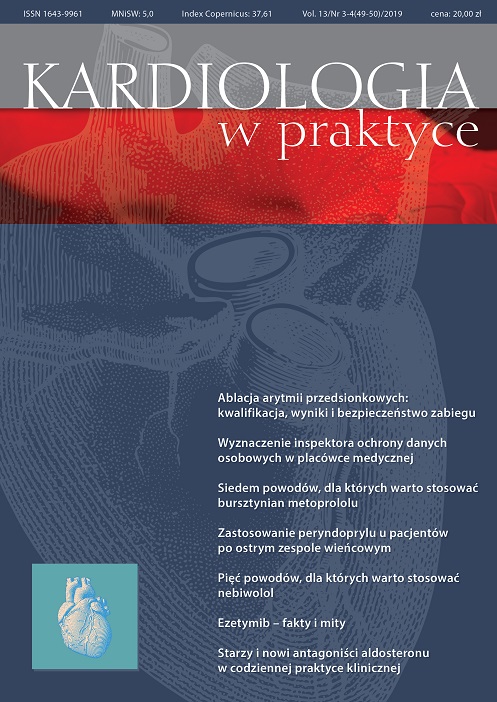Use of perindopril in patients after acute coronary syndrome Review article
Main Article Content
Abstract
Converting enzyme inhibitors are one of the most effective groups of drugs in patients under both primary and secondary prevention of coronary artery disease. Their mechanism of action is blocking the renin–angiotensin–aldosterone system. Due to their multi-directional (vasodilating, anti-aggregation, anti-lipoliferative) effects, their use has long gone beyond the limits of hypertensiology. Of the substances available in this group, perindopril is the drug with the most proven effectiveness in reducing the risk of death due to coronary heart disease.
Downloads
Article Details

This work is licensed under a Creative Commons Attribution-NonCommercial 4.0 International License.
Copyright: © Medical Education sp. z o.o. This is an Open Access article distributed under the terms of the Attribution-NonCommercial 4.0 International (CC BY-NC 4.0). License (https://creativecommons.org/licenses/by-nc/4.0/), allowing third parties to copy and redistribute the material in any medium or format and to remix, transform, and build upon the material, provided the original work is properly cited and states its license.
Address reprint requests to: Medical Education, Marcin Kuźma (marcin.kuzma@mededu.pl)
References
2. López-Sendón J., Swedberg K., McMurray J. et al.; Task Force on ACE-inhibitors of the European Society of Cardiology: Expert consensus document on angiotensin converting enzyme inhibitors in cardiovascular disease. The Task Force on ACE-inhibitors of the European Society of Cardiology. Eur. Heart J. 2004; 25: 1454-1470.
3. Ceconi C., Francolini G., Olivares A.: Angiotensin-converting enzyme (ACE) inhibitors have different selectivity for bradykinin binding sites of human somatic ACE. Eur. J. Pharmacol. 2007; 577(1-3): 1-6.
4. Morimoto T., Gandhi T.K., Fiskio J.M. et al.: An evaluation of risk factors for adverse drug events associated with angiotensin-converting enzyme inhibitors. J. Eval. Clin. Pract. 2004; 10(4): 499-509.
5. Agusti A., Bonet S., Arnau J.M. et al.: Adverse Effects of ACE Inhibitors in Patients with Chronic Heart Failure and/or Ventricular Dysfunction. Meta-Analysis of Randomised Clinical Trials. Drug Saf. 2003; 26 (12): 895-908.
6. The HOPE Investigators: Effects of angiotensin-converting-enzyme inhibitor, on cardiovscular events in high risk patients. N. Engl. J. Med. 2000; 342: 145-152.
7. Peryndopryl – charakterystyka produktu leczniczego.
8. ISIS-4: a randomised factorial trial assessing early oral captopril, oral mononitrate, and intravenous magnesium sulphate in 58,050 patients with suspected acute myocardial infarction. ISIS-4 (Fourth International Study of Infarct Survival) Collaborative Group. Lancet 1995; 345(8951): 669-685.
9. Indications for ACE inhibitors in the early treatment of acute myocardial infarction: systematic overview of individual data from 100,000 patients in randomized trials. ACE Inhibitor Myocardial Infarction Collaborative Group. Circulation 1998; 97(22): 2202-2212.
10. Fox K.M.; EUROPA Investigators: Efficacy of perindopril in reduction of cardiovascular events among patients with stable coronary artery disease: randomised, double blind, placebo controlled, multicentre trial (the EUROPA study). Lancet 2003; 362: 782-788.
11. Daly C.A., Fox K.M., Remme W.J. et al.: The effect of perindopril on cardiovascular morbidity and mortality in patients with diabetes in the EUROPA study: results from the PERSUADE substudy. Eur. Heart J. 2005; 26: 1369-1378.
12. Ceconi C., Fox K.M., Remme W.J. et al.: ACE inhibition with perindopril and endothelial function. Results of a substudy of the EUROPA study: PERTINENT. Cardiovasc. Res. 2007; 73: 237-246.

